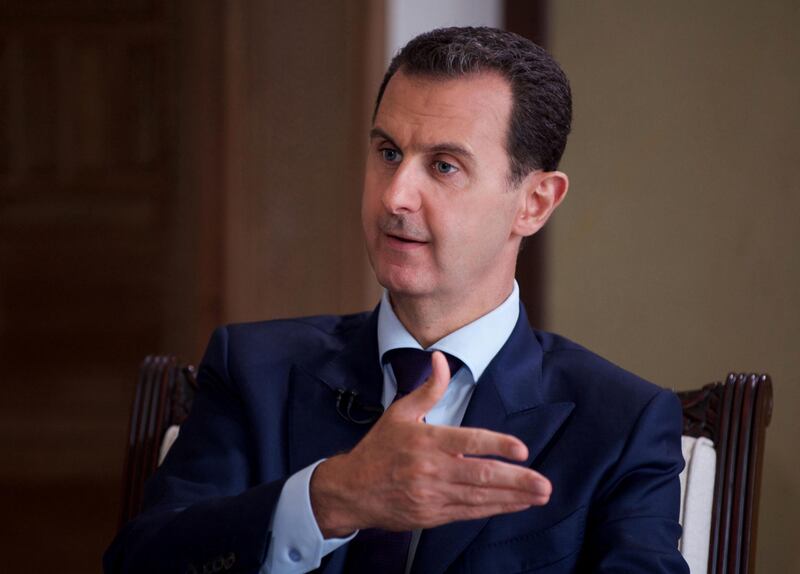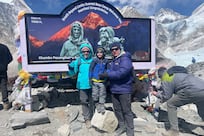The American-led coalition in Syria conducted air and artillery strikes against forces loyal to President Bashar Al Assad, killing 100, the US military said, in one of the worst ever such clashes.
The operation overnight on Wednesday underscored the spiralling nature of the war, with the United States saying it took the action in Deir Ezzor province to repel an attack on Kurdish fighters it has partnered with in the area against ISIL.
The regime was likely seeking to reclaim ground once held by ISIL but now controlled by the US-backed Syrian Democratic Forces. But the American strikes also followed days of allegations that Mr Al Assad's regime was using chemical weapons in rebel-held areas. The claims are under investigation by the United Nations.
According to the Syrian Observatory for Human Rights, local tribal fighters loyal to Mr Al Assad — who has pledged to reclaim all Syrian territory — and Afghan Shiite militias fighting alongside them launched the initial attack against the SDF.
The US military said its operations centred on an area eight kilometres east of the Euphrates River de-confliction line, a reference to a boundary agreed by Russia and the US, with the former's area of operations west of the river and the latter's to its east.
ISIL fighters were flushed out of their last strongholds in eastern Syria and over the border in western Iraq late last year. But the SDF continues to hunt down insurgents who remain in the area ready to restart an insurgency.
The combination of air and artillery strikes countered an "unprovoked attack against well-established Syrian Democratic Forces headquarters", the US Central Command said.
US military officials said the attacks were conducted to "repel acts of aggression".
"We estimate more than 100 Syrian pro-regime forces were killed while engaging SDF and coalition forces," an official said, adding that the strikes targeted nearly 500 "pro-regime" forces armed with tanks and artillery.
According to the US Central Command, coalition advisers were present in the area that was attacked.
The operation was launched after "20 to 30 artillery and tank rounds landed within 500 metres of the SDF headquarters location."
_______________
Read more:
Syrian regime's offensive claims 'highest death toll' in months
France says 'all indications' point to Syrian regime using chlorine weapons
Rebels make thousands smuggling ISIL fighters across Syria
_______________
The Observatory gave a significantly lower toll, confirming 45 dead among pro-regime forces, and saying the initial attack took place near the town of Khasham.
The head of the Britain-based monitoring group, Rami Abdel Rahman, said the aim of the regime attack appeared to be the retaking of a major oilfield and a large gas plant in the SDF-held area.
The Omar oilfield, one of the biggest in Syria, had a pre-war output of 30,000 barrels per day, while the Conoco gas field had a pre-war capacity of 13 million cubic metres a day.
In western Syria, meanwhile, four consecutive days of regime bombardment on the rebel-held zone of Eastern Ghouta, outside Damascus, have killed more than 100 civilians, drawing global attention to the regime's deepening effort to reclaim opposition territory.
Warplanes dropped bombs for the fourth consecutive day on Thursday, killing at least 38 civilians and wounding dozens, according to the Observatory.
The latest bloodshed moved the death toll close to 200 for the week and left medics completely overwhelmed. The UN's call earlier this week for a month-long ceasefire to address what it calls a dire humanitarian situation has gone unheeded.
With few bulldozers and precious little fuel to operate them, rescue workers have struggled to reach trapped civilians and are having to work under fire.
"There was a huge, huge escalation against the city. More than one place was reduced to rubble," said Abu Mohammad Omar, a 23-year-old rescue worker.
The bombardments are suspected to have involved use of chlorine gas.
British Foreign Secretary Boris Johnson said on Thursday that the last week had involved "new levels of suffering in Eastern Ghouta and Idlib, among these are reports of chemical weapons use".
"This has to stop," he said. "The world is looking at the Assad regime, Russia and Iran: you hold the keys not only to the end of this obscene conflict, but to the safety, humanitarian aid and basic medical treatment that is being denied to millions of people right now in Syria. Your failure to provide this is simply unconscionable."
Eastern Ghouta was one of several so-called de-escalation zones agreed last year by three of the main outside players in the conflict — Turkey, Iran and Russia.
Turkey announced on Thursday it would host a new three-way summit to revive efforts to end the war, which has killed at least 340,000 people and displaced millions since 2011.
A similar effort involving Turkey, Iran and Russia earlier this month made no significant progress.





